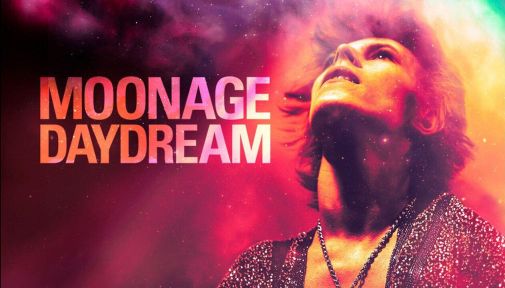By Glenn Dunks

Moonage Daydream is unlike any other Brett Morgen film. If you expected the same stately warmth that imbued Jane or even a tragic rock and roll epitaph like Cobain: Montage of Heck, then you would be wrong. This is evident immediately into its 140-minute runtime, beginning as it does with not just any David Bowie song, but the (incredible, it must be noted) Pet Shop Boys remix of “Hallo Spaceboy” from 1996. I love a bit of trolling the rock crowd, so I was instantly on board. The mere inclusion of this song—to say nothing of the kaleidoscopic, tie-dyed montage that accompanies it—keyed me in that Morgen wasn’t just going to do what a Bowie fan may expect from a biography documentary.
These high-octane opening minutes don’t exactly let up, either. Moonage Daydream is a work of documentary that is almost as exhausting as it is exhilarating.
But even when its non-stop smash-up of interviews, music videos, film clips (including other Bowie documentaries like Ricochet and Cracked Actor), archive footage, visual effects and hallucinogenic ephemera can feel like too much movie, it is at least doing something that too few musician bio-docs even think of attempting.
Morgen has said that this was film about “David Bowie”—quotation marks his own. This isn’t the story of David Robert Jones. For example, a press email I received stated that it starred David Bowie, The Thin White Duke and Ziggy Stardust. Cute. There are no expert interviews here and the story is not your standard cradle to grave biography that we get more often than not with films about music superstars Bowie’s ilk. To go back to the Pet Shop Boys thing and to give you a better idea of the situation: when I spoke to the director outside the theatre after it’s Melbourne International Film Festival screening last week, we spoke more about the inclusion of the remix. His answer felt on point in that anybody who would grimace at such an inclusion probably isn’t the audience of Moonage Daydream. This isn’t hagiography; it’s something closer to interpretation and won't be for everybody.
I got to experience the documentary in IMAX for which it has been optimized. I would say it is definitely worth it. And I mean the real IMAX cinemas, not those rebranded multiplex venues. Although I struggled occasionally with the sound mix being almost too loud and muffling the ability to really focus on the lyrics or what he was saying in interview clips, the sheer magnitude of sensory activation here is the sort of thing I wish these films utilised more of. I want to hear these songs pumped loud through the speakers! I want to experience something more than just a history lesson. Baz Luhrmann will love it!

Morgen edited the film through the pandemic in isolation. You might think he spent some time taking drugs of indulging in sensory deprivation tanks based on the explosion of colour that gets pummelled into a viewer watching this on the big screen. He didn’t, but I am sure many will be tempted to imbibe. The film is probably too long, although I doubt Bowie tragics will mind too much if they’re in its groove. Some may miss various parts of his career that they hold particularly close, but it’s not wise to think of Moonage Daydream as that sort of film. As Morgen said himself, as much as the late ‘90s and onwards to his death in January 2016 produced some impeccable music, the David Bowie narrative was more or less complete. To have continued on would have been fan-indulgent rather than filmmaker-indulgent. Which, let’s be honest, the movie already is; but with intent and purpose.
Everybody’s experience with David Bowie is entirely different, but Morgen appears intent to tell it as a man who was (as Bowie himself puts it) a collector of personalities. The sort of man who was a Buddhist one day and into Nietzsche the next. Morgen isn’t interested in record sales or even critical assessments of his work. He thankfully realizes something that too few documentaries do—it is far more interesting to experience an artist’s work through film rather than listen to somebody blather on about why it was good and what it means. Not that there’s anything wrong with those type of films. They serve a valid purpose and sometimes they approach greatness with what they do within those confines. But while Bowie’s music certainly lends itself to analysis, if you want that go and read a book. This is an experience and should be viewed as such.
Release: Released globally next month with limited IMAX engagements. For Melbourne readers, there are still two sessions on Friday 19 and Sunday 21.
Award chances: I’d be more bullish with its chances if the Oscar branch had nominated last year’s The Velvet Underground. But while Todd Haynes’ film made the shortlist, it ultimately wasn’t selected among the final five. I suspect a similar fate for Moonage Daydream. It will likely be popular with audiences and in awards season, but the style will likely hinder it’s chances unless they are in a particularly frisky mood.